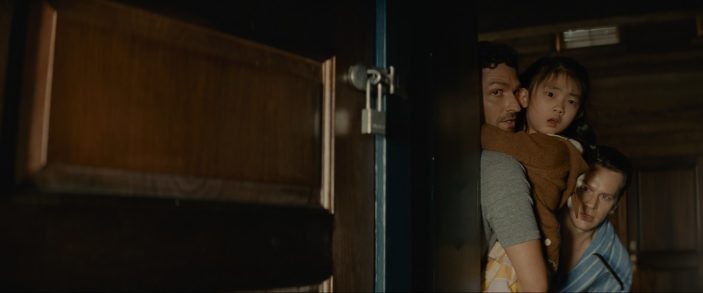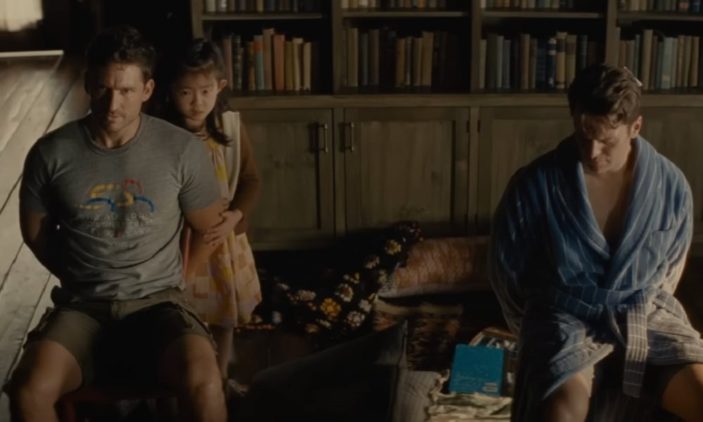
The combination of the dangerous uncertainty of M. Night Shyamalan’s narratives and Dave Bautista’s imposing stature is something very few of us would care to endure. Especially if it’s at the supposed end of the world!
In the apocalyptic thriller Knock at the Cabin, Shyamalan invites his audience on an intense thrill-ride, detailing a couple residing in their getaway cabin – played by Jonathan Groff and Ben Aldridge – and the mysterious quartet of strangers who interrupt them, claiming the end of the world is upon them and only their sacrifice will save humanity.
As the film releases in theatres this week, our Peter Gray spoke with both Jonathan and Ben about the natural representation of queer relationships on screen, the intensity of working with Dave Bautista, and what prompted Jonathan to break out into Aerosmith.
As a gay man, the natural representation here is something that hit a certain emotionality for me. Did you find in reading the script, or reading the book, that these characters being gay added a certain sense of dread? That it had that narrative of the actions being possibly related or a hate crime or is it in fact the apocalypse? I put that to the both of you.
Ben Aldridge: Yeah, I think for me, Andrew thinks they’ve been targeted right until the moment that he sees the plane in the sky when he’s outside. I think up until that point he had some doubts. There are many coincides here. I think the whole time he thinks that they’ve been targeted, and I think he lives his life in fear of that homophobic attack that we witness in the film. I’m sure a lot of people can relate to (that). I’ve been in a situation not completely dissimilar to that, and it took away some of my confidence I think, so I could definitely relate to that. That was quite a unique thing.
The book details that feeling of thinking those thoughts and living in fear really well. It’s super detailed about his struggle with that and why he took up martial arts. In the book it’s martial arts, it’s boxing in the film (but) that’s why he has the gun and why he’s brought the gun out with him to the countryside, because of that fear of that happening again. He’s scared for his family. Two dads being judged and people saying something. So, yeah. It’s definitely dread. It’s a very sad and harrowing truth that some people will have to experience, and now more than ever, there are more homophobic hate crimes being reported. It’s relevant.
Jonathan Groff: That’s really good. I don’t have anything to add to that. I agree with everything Ben said.
Do you find there’s a difference for both of you in approaching a queer character compared to straight?
Ben Aldridge: Yeah. Interesting. I feel like I connect differently to playing a queer character. There’s an extra layer of something that I can relate to, and it feels more exposing. I feel slightly closer to them. I don’t know necessarily that my approach is any different (but) I’m just trying to do my best. There’s a closer emotional connection to other things that I have played. And that’s a new thing for me. It’s super rewarding.
Jonathan Groff: It’s been a journey, because the first straight character that I played was on Broadway for a couple of years. I was in the closet. I was not an out actor when I was playing straight. So, in that, my life and my work felt very compartmentalised. The show, it was called Spring Awakening, was a very sexual show, and there was always a part of me that was worried that I was going to get found out. That something I would do wouldn’t be believable. There was this underlying stress of that that I had to get over. I would say as the years go by, that stress goes away, because I’m out and have nothing to hide.
I just did a musical off Broadway where I had two wives, and I didn’t really think about if I was going to be believable (or not), and I think part of that is because coming out of the closet was so liberating and allowed me to bring myself and my experience into the room creatively, no matter what sexuality I’m playing. I found whether it was a gay or a straight character, I was able to bring more of my own experience and make it more personal to me in the rehearsal. Ultimately, coming out made playing straight and gay more personal and more believable.

With the film being about the apocalypse, was the possibility of the world ending ever something you worried about?
Ben Aldridge: When I was younger I was quite obsessed with the apocalypse, which I think was brought on by watching Armageddon and Deep Impact. Love both those films.
Jonathan Groff: (Singing) “I don’t wanna close my eyes. I don’t wanna fall asleep, ’cause I miss you babe…”
Ben Aldridge: I used to have that song on single…
Jonathan Groff: I had the CD of the soundtrack of Armageddon (too).
Ben Aldridge: Yeah, so that kind of really sparked an interest, or a fear, actually, of me thinking of armageddon happening. I also grew up in quite a religious environment, an evangelical environment, and I decided to try and interpret the Book of Revelation in the Bible, which is completely coded and just this ridiculous pictorial poem, and I though that 10-year-old me could look into Nostradamus prophecies. I was convinced (the end of the world) was going to be very soon. So yeah, a bit of a fascination with it.
We’ve just lived through a pandemic, the climate crisis is very much looming and present, and I think that what Night (Shyamalan) is doing here, and what Paul Tremblay was doing when he wrote the book, was kind of playing on our collective fears as a society. I think the book and the film ask the viewer to question their own kind of social conscience and responsibility towards humanity and the rest of the world. I don’t think that’s a message the movie is trying punch home, but I think it’s there in the take away.
And you’re in a single location, a tight space, facing off against Dave Bautista. How was it to shoot with such intensity?
Jonathan Groff: It was relentless. I’ve never done a scary movie before, and having to be at that level of emotion of stress every time they said action without really a lead up? There was a strong of several weeks, we shot it mostly in order (too), and towards the end of those weeks it was like “We’re going back in the cabin and act at an 11.” It was intense to do that. Whenever it was a wide shot, we were actually tied to those chairs, which took some time for the crew to rope us in, and I would have to do some deep breathing through my nose to not start to get a little panicked. I would just kind of stare at my feet and be, like, OK, I’m in these ropes. The seven actors in that room, we really had each other’s backs, and everyone was committed to the same level of intensity.
Ben Aldridge: With Dave, I was kind of nervous. Obviously he’s an experienced wrestler, (so) I was like, hey, he’s gonna be the strength of…Man, he’s massive! But he’s such a pro, and he’s so careful. He’s so concerned about people not injuring themselves, and people being comfortable. He’s so concerned about his own body and not getting an injury. He’s super conscious in every moment of everyone working efficiently. It was an excited kind of nervous. He’s very considerate, which is lovely.
Knock at the Cabin is screening in Australian theatres from February 2nd, 2023.
